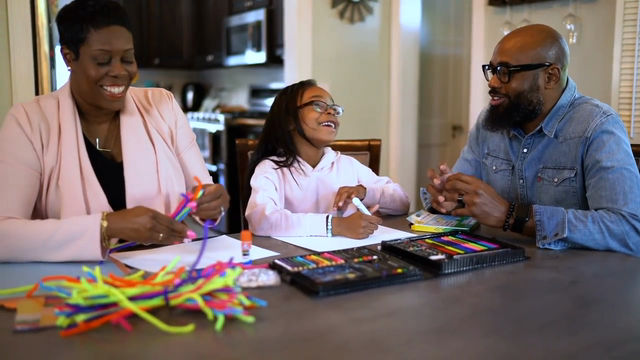T. Rowe Price: Black Families Prioritize Money Conversations with Kids More Than Other Racial Groups
Parents, Kids & Money Survey corroborates evidence of the racial wealth gap, prompting T. Rowe Price to expand commitments to its financial education program
NEWS
A new study from T. Rowe Price reveals that, compared with other racial/ethnic groups, Black families put more emphasis on having conversations about saving money, spending wisely, setting financial goals, and family finances.
T. Rowe Price’s 12th annual Parents, Kids & Money Survey, which sampled more than 2,000 parents of 8- to 14-year-olds and their kids, reveals insights on the ways that parents of different racial/ethnic groups discuss financial concepts with kids in light of the well-documented racial wealth gap.
“We’re encouraged to see that many Black families are frequently having money conversations with their kids, as we’ve learned that these discussions can be powerful drivers for building financial capabilities in adulthood,” says Renee Christoff, head of Global Associate Engagement + Corporate Responsibility at T. Rowe Price. “However, we know that having financial capabilities does not automatically equate to having the ability to build wealth. The factors contributing to the racial wealth gap are complex, intertwined with history, and we believe there is an opportunity for our financial education programming to address aspects of it.”
HOW WE’RE TAKING ACTION
T. Rowe Price recognizes that financial institutions have historically played a significant role in the creation of the wealth gap, and the firm is dedicated to being part of the solution to counteract this legacy.
As a part of the firm’s ongoing commitment to promoting racial equity, the results of this study mark a necessary step for T. Rowe Price to better understand the landscape and evaluate how its financial education program can promote wealth accumulation among Black families.
“Home ownership and retirement savings can serve as powerful generators of wealth creation,” Ms. Christoff says. “Helping Black children understand how to access these wealth-building investments will be integrated into our program going forward, as part of our ongoing and evolving commitment to advancing racial equity in our communities.”
Last summer, T. Rowe Price announced that it would be donating $2 million toward organizations that are working to address racial inequality, in addition to donating more than $2.4 million over the past five years to organizations seeking to increase access and opportunity to people of color. The T. Rowe Price Foundation has also increased its funding to advance equity and to support minority-led organizations by 130% over the past five years.
The firm’s Parents, Kids & Money Survey has consistently shown that there is an opportunity for all parents to have more money conversations with their kids. To help parents discuss money with their kids, the firm created MoneyConfidentKids.com, which provides free online educational games; tips for parents that are focused on financial concepts, such as goal-setting, spending versus saving, inflation, asset allocation, and investment diversification; and classroom lessons for educators.
MONEY CONVERSATIONS AND ATTITUDES VARY BY RACE
- Black parents are more likely to say discussing money is important: Black parents find talking with their child about saving money and spending wisely (58%) more important than white parents (44%), Asian parents (38%), and Hispanic parents (46%). Similarly, Black parents find talking with their child about family finances (38%) more important than white parents (26%), Asian parents (21%), and Hispanic parents (26%). And Black parents find talking with their child about setting financial goals (47%) more important than white parents (37%), Asian parents (20%), and Hispanic parents (41%).
- White parents are more likely to say they only talk about money when kids ask: Thirty-eight percent of white parents agree with the statement, “I generally only talk to my kids about money when they ask,” compared with only 3% of Black parents who agree with the statement.
- Kids of Black parents are more likely to say their parents always discuss money with them: Compared with kids of white parents, more kids of Black parents say their parents always discuss with them the importance of saving (42% vs. 32%), maintaining a budget (35% vs. 19%), and setting financial goals (29% vs. 18%). However, there is evidence to suggest that these conversations are more likely to happen in private settings, as 54% of kids of Black parents say their parents tell them not to discuss money in public compared with only 18% of kids of white parents.
- Conversations make a difference: More Black parents and their kids (30% and 26%) say that conversations about finance make a difference versus white parents and their kids (18% and 19%).
- Potential differences in allowances: Black parents report giving an allowance to their kids more than white parents (78% vs. 68%). However, these findings were not corroborated by kids’ responses, as 90% of kids of white parents report receiving an allowance compared with 88% of kids of Black parents. Previous Parents, Kids & Money Surveys have revealed that providing an allowance can be effective an teaching tool in helping kids understand money.
- Understanding the value of a dollar: Forty percent of white parents say they have a hard time making their kids understand the value of a dollar compared with only 26% of Black parents.
EVIDENCE OF THE RACIAL WEALTH GAP
- Fewer Black parents have retirement savings: Compared with white parents, fewer Black parents have money saved for retirement (46% vs. 55%). While many families under-save for retirement, this problem appears to be particularly acute among Black families. Additionally, Black parents are less likely than white parents to save using a 401(k) or other employer-sponsored plan (42% vs. 55%), Roth IRA (13% vs. 20%), and Traditional IRA (17% vs. 21%).
- Black parents with retirement savings are more likely to make withdrawals from it: Thirty-one percent of white parents with retirement savings have withdrawn money from it within the past two years compared with 43% of Black parents. The top reason white parents cited for withdrawing retirement funds was covering a home repair (34%), whereas the top reason Black families cited was paying off debt (43%).
- Black parents are less likely to have a mortgage: When looking at types of debt, Black parents were less likely than white parents to have a mortgage (32% vs. 47%). This finding is consistent with home ownership rates reported by U.S. census data in the first quarter of 2020, which found a gap in home ownership rates among all Black and white households (44% vs. 74%).
- More Black parents are carrying student loan debt: More Black parents carry student loan debt than white parents from both of their own student loans (34% vs. 22%) and their kids’ student loans (10% vs. 5%).
MONEY CONFIDENT KIDS is a registered trademark of T. Rowe Price Group, Inc.
ABOUT THE SURVEY
The 12th annual T. Rowe Price Parents, Kids & Money Survey, conducted by Dynata, aimed to understand the basic financial knowledge, attitudes, and behaviors of both parents of kids ages 8 to 14 and their kids ages 8 to 14. The survey was fielded from January 6, 2020, through January 20, 2020, with a sample size of 2,030 parents and 2,030 kids ages 8 to 14. The margin of error is +/- 2.1 percentage points. All statistical testing done among subgroups is conducted at the 95% confidence level. Reporting includes only findings that are statistically significant at this level.
ABOUT T. ROWE PRICE
Founded in 1937, Baltimore-based T. Rowe Price Group, Inc. (NASDAQ-GS: TROW) is a global investment management organization with $1.30 trillion in assets under management as of October 31, 2020. The organization provides a broad array of mutual funds, subadvisory services, and separate account management for individual and institutional investors, retirement plans, and financial intermediaries. The company also offers a variety of sophisticated investment planning and guidance tools. T. Rowe Price's disciplined, risk-aware investment approach focuses on diversification, style consistency, and fundamental research. For more information, visit troweprice.com or our Twitter, YouTube, LinkedIn, Instagram, and Facebook sites.
CONTACT US
Heather McDonold
443-834-4132
heather_mcdonold@troweprice.com
Monique Bosco
410-345-5740
Monique.Bosco@troweprice.com
Kim Francois
443-687-0249
kim.francois@troweprice.com



